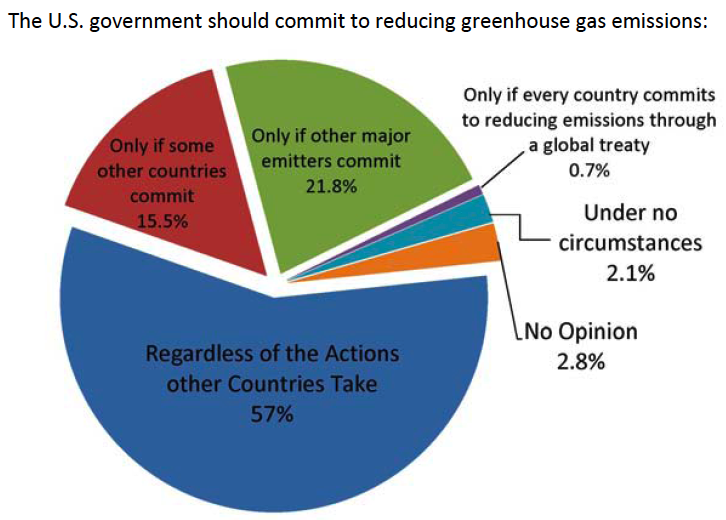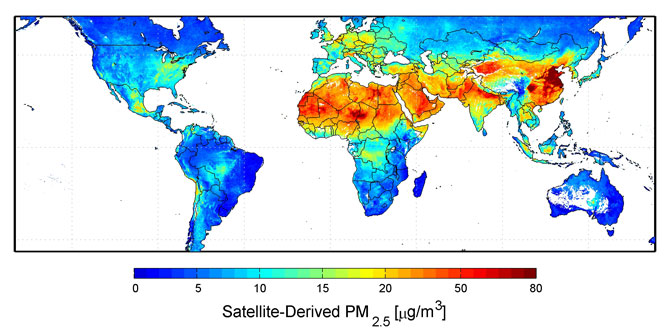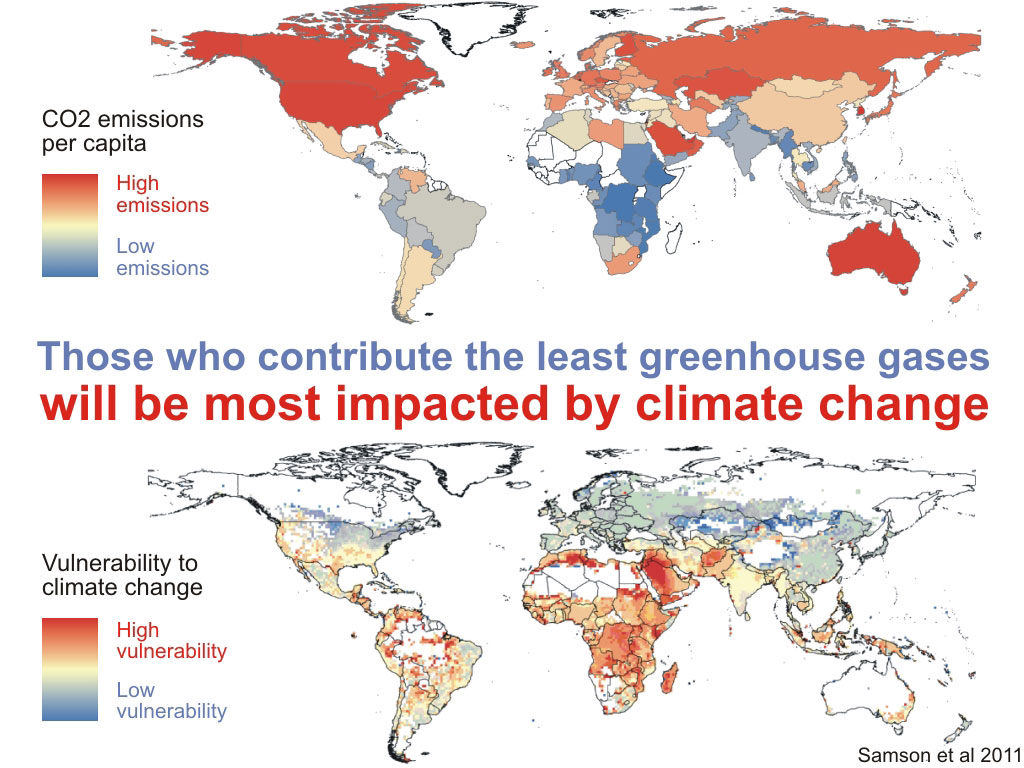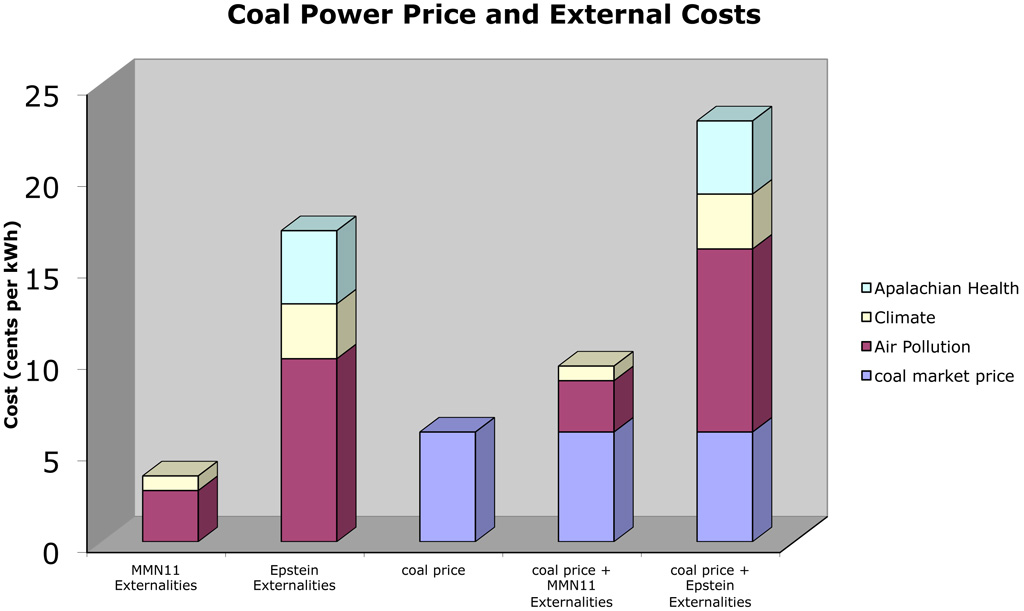Roy Spencer's Bad Economics
Posted on 15 March 2012 by dana1981
 While they can't seem to agree about what is causing global warming (except that it must somehow mainly be something other than human CO2 emissions), the few climate scientist "skeptics" do all seem to agree on one issue - that somehow reducing greenhouse gas emissions will harm the economy. Why these climate scientists consider themselves economics experts is a mystery, but as we have frequently detailed, climate economic studies consistently show that CO2 limits will actually save money. Yale economist William Nordhaus, who is quite conservative in his estimates regarding future climate change costs (also see this explanation of Nordhaus' optimism by Joe Romm), recently made this point emphatically:
While they can't seem to agree about what is causing global warming (except that it must somehow mainly be something other than human CO2 emissions), the few climate scientist "skeptics" do all seem to agree on one issue - that somehow reducing greenhouse gas emissions will harm the economy. Why these climate scientists consider themselves economics experts is a mystery, but as we have frequently detailed, climate economic studies consistently show that CO2 limits will actually save money. Yale economist William Nordhaus, who is quite conservative in his estimates regarding future climate change costs (also see this explanation of Nordhaus' optimism by Joe Romm), recently made this point emphatically:
"...the cost of waiting fifty years to begin reducing CO2 emissions is $2.3 trillion in 2005 prices. If we bring that number to today’s economy and prices, the loss from waiting is $4.1 trillion....The claim that cap-and-trade legislation or carbon taxes would be ruinous or disastrous to our societies does not stand up to serious economic analysis."
Even economists who are conservative and relatlively optimistic about the potential impacts of climate change agree that limiting CO2 emissions will save trillions of dollars. Yet certain individuals (who lack economics expertise) are convinced that taking these measures will somehow cripple the economy.
No climate scientist "skeptic" embodies this trait of bad economic arguments more than Roy Spencer, who has gone as far as to publish a book about free market economics. Ironically, the proposed solutions to climate change which Spencer opposes are free market concepts, originated by the Republican Party. As we will see in this post, Spencer has a very incorrect view on a number of climate-related economic issues.
Particulate Pollution
In a recent post on his blog, Spencer criticized the US Environmental Protection Agency (EPA) regulations of fine particulate matter. This is a poor choice of regulations to criticize from an economic standpoint. The Office of Management and Budget (OMB) estimates the costs and benefits of US federal regulations every year. In 2011, the OMB report concluded as follows (emphasis added).
"the rules with the highest benefits and the highest costs, by far, come from the Environmental Protection Agency and in particular its Office of Air. More specifically, EPA rules account for 62 to 84 percent of the monetized benefits and 46 to 53 percent of the monetized costs.18 The rules that aim to improve air quality account for 95 to 97 percent of the benefits of EPA rules.
It is important to emphasize that the large estimated benefits of EPA rules are mostly attributable to the reduction in public exposure to a single air pollutant: fine particulate matter. Of its 20 air rules, the rule with the highest estimated benefits is the Clean Air Fine Particle Implementation Rule, with benefits ranging from $19 billion to $167 billion per year."
In the blog post, Spencer also shows Figure 1 below, claiming
"You will note that the most “polluted” air occurs where almost no one is around to pollute: in the deserts. This is because wind blowing over bare soil causes dust particles."
Figure 1: fine particulate measurements
The people in China and India would undoubtedly object to Spencer's claim that the most polluted air only occurs in deserts. The Chinese government is taking steps to better monitor and reduce fine particulates because of their detrimental health effects.
Additionally, one of the biggest pollution threats in developing regions like Africa is indoor combustion from biomass fires without proper ventilation, which may be responsible for 800,000 to 2.4 million premature deaths each year.
Spencer's reason for discounting pollution in India and China and biomass burning in Africa is to support this argument:
"...the most “polluted” air occurs where almost no one is around to pollute: in the deserts...If you really are worried about fine particulate air pollution, do not go outside on a windy day."
However, most dust and sand particulates are larger than the small particulates addressed by EPA regulations. Moreover, the USA is not covered in deserts, and thus Spencer is comparing apples (supposed particulates from desert sand) and oranges (supposed particulates from airborne dust).
Particulates from combustion are typically much smaller than sand or dust, remaining suspended in the atmosphere and penetrating deep into the lungs. They can also be coated with carcinogenic compounds, which explains their much greater adverse health effects and why the EPA regulates their emissions in order to protect public health and welfare. To equate larger dust particulates with smaller combustion particulates reveals a lack of understanding of the health threats Spencer is dismissing.
Spencer's Tragedy
Spencer finishes the particulates blog post by trying to connect the dots to climate mitigation efforts.
"And I haven’t even mentioned carbon dioxide regulations. Even if we could substantially reduce U.S. CO2 emissions in the next 20 years, which barring some new technology is virtually impossible, the resulting (theoretically-computed) impact on U.S or global temperatures would be unmeasurable….hundredths of a degree C at best.
The cost in terms of human suffering, however, will be immense."
The main error in this argument is the Tragedy of the Commons - a dilemma arising from the situation in which multiple individuals, acting independently and rationally consulting their own self-interest, will ultimately deplete a shared limited resource even when it is clear that it is not in anyone's long-term interest for this to happen.
There is a nugget of truth to Spencer's argument, but if every nation were to make his argument (and if the USA can make it as one of the world's largest emitters, then every nation can make it), then nobody would reduce their CO2 emissions. However, the most optimal result involves every nation reducing emissions, which is why there are international climate conferences like Kyoto and Copenhagen, to try and achieve international agreements for all nations to reduce emissions. If everyone thought like Roy Spencer, this most optimal result would become impossible to achieve.
Moreover, the USA is one of the world's largest per capita CO2 emitters, and the largest historical CO2 emitter. We should be leading the way in reducing CO2 emissions, not making excuses that our emissions are too small to matter. Spencer's argument is simply irresponsible.
And of course, Spencer's argument that CO2 limits will result in 'immense human suffering' is entirely without basis. CO2 limits will both help the economy and the poor. In fact, one of the worst climate ironies is that the poorest nations, which contribute the least to the problem, will tend to be the most impacted by human-caused climate change (Figure 2).
Figure 2: Per capita emissions vs. vulnerability to climate change, from Samson et al. (2011)
Thus Spencer has it exactly backwards - if we follow his advice and fail to reduce CO2 emissions, that is the scenario in which human suffering will be maximized.
Spencer's Ill-Conceived Motivation
Spencer of course sees things differently, and does not intend to harm the poor. In a recent interview, Spencer discussed his motivations for speaking out on climate and economics issues (emphasis his):
"[the journalist] provided several paragraphs alluding to why scientists on the other side of the issue speak out, but nowhere could I find reasons why WE speak out.
I had told her that ill-conceived energy policies that hurt economic growth kill poor people."
This is consistent with Spencer's previous statement that
"...my job has helped save our economy from the economic ravages of out-of-control environmental extremism.
I view my job a little like a legislator, supported by the taxpayer, to protect the interests of the taxpayer and to minimize the role of government."
In short, Spencer thinks government (especially environmental) regulation harms the economy, which he believes in turn kills poor people. Of course, we have already seen that Spencer's views could not be further from the truth, as EPA particulate regulations are saving tens to hundreds of billions of dollars per year in the USA, and climate economics experts agree that reducing CO2 emissions will similarly save money. Moreover, exactly what "ill-conceived energy policies" does Spencer refer to? Most climate mitigation policies center around putting a price on carbon emissions, which does not hurt economic growth. For example, aggressive installation of solar panels has lowered electric prices in Germany, and renewable energy standards have no statistically significant impact on electricity rates.
Spencer's misunderstanding of climate economics is based on his anti-government views, as he further illustrates in his pollution-defending blog post:
"government jobs programs...only create special interest jobs at the expense of more useful (to the consumer) private sector jobs."
This concept that the government cannot create jobs because any government jobs will "crowd out" private sector jobs is fairly common among political conservatives, but simply has no basis in our current reality. Note that fellow climate "skeptic" Bob Carter made a similar argument.
In reality, there are only a few circumstances in which this "crowding out" argument holds true; generally when the economy's resources are being fully utilized, which is rarely the case. It's certainly not true in today's stagnant economic conditions, when private investment and growth is low. Under these conditions, public investment provide jobs to the unemployed without "crowding out" private investment.
In fact, reality is disproving Spencer's "crowding out" argument at this very moment. If Spencer were correct, then cutting government spending (a.k.a. "austerity") would lead to private sector job growth and decreased unemployment. On the contrary, in countries currently practicing austerity (such as Ireland, Spain, Portugal, Greece, and the UK), unemployment is rising.
Demonizing James Hansen
"James Hansen...actively campaign[s] for Malthusian energy policy changes"
Malthusianism generally refers to the concern that human population growth and resource depletion are unsustainable and will eventually lead to an ecological collapse or other catastrophe. While this may be an accurate description of Hansen's concerns (that human fossil fuel combustion will lead to catastrophic climate change if it continues unabated) Hansen's suggested energy policy is in no way Malthusian.
A Malthusian energy policy would involve limiting the human population, or rationing consumption for the sake of sustaining energy supplies. On the contrary, Hansen thinks we have more fossil fuel resources than we can afford to burn (i.e. Kharecha and Hansen 2008). The energy policy changes Hansen advocates for are quite straightforward - transition away from our reliance on fossil fuels by taxing carbon emissions, and return 100% of the taxed funds to the public through a dividend. This is a free market solution, and thus a proposal that Spencer, as a free market proponent, should support, rather than attaching negative labels to it. Hansen's straightforward explanation of this simple market-based approach is well worth viewing towards the end of the video in the link above.
Simple Economics Misunderstood
The economics of carbon pricing are actually quite simple. Even climate scientist "skeptics" like Spencer agree that human CO2 emissions are causing some climate change. There is a price tag associated with that climate change, just like there is a price tag associated with the detrimental health effects of particulate pollution.
When that cost is not reflected in the market price of the products which result in those emissions - as is currently the case with fossil fuels and CO2 - this is called a negative economic "externality," which economists consider a market failure. The problem is that when these externalities are not reflected in market prices, consumers are unable to factor them into their decision making. For example, putting a price on particulate emissions reflects their true cost on public health, encourages consumers to consume less of the products which result in these emissions, and demand lower-emissions products, which drives technological innovations and thus leads to lower overall emissions.
The same principle would hold true for greenhouse gases. Prior to putting a price on particulate emissions, industries claimed the costs would be immense and damage the economy, as "skeptics" now claim about CO2 limits. In fact, industries and researchers have consistently overestimated the costs of environmental regulations. As we saw above, the costs of reducing particulate emissions have been much smaller than claimed, and have been far exceeded by the economic benefits. In fact, two of the largest externalities associated with coal combustion come from air pollution and climate change (Figure 3).
Figure 3: Average US coal electricity price vs. MMN11 and Epstein 2011 best estimate coal external costs.
That is not to say the costs will be small - the OMB found that environmental regulations have been among the most costly government regulations, but they have also resulted in the largest savings, and the largest net benefit to the economy of any government regulations. There is no reason to expect CO2 limits to cripple the economy, especially since economic studies conclude they will save money.
Spencer appears to think otherwise because he believes that all government and environmental regulations will harm the economy. However, Spencer's belief is factually wrong, and he should leave economics to the economists (Figure 4).

Figure 4: New York University survey results of economists with climate expertise when asked under what circumstances the USA should reduce its emissions































 Arguments
Arguments

































[dana1981] Yes, thanks. Corrected.
[DB] Note: This comment was inadvertently deleted and has been restored.